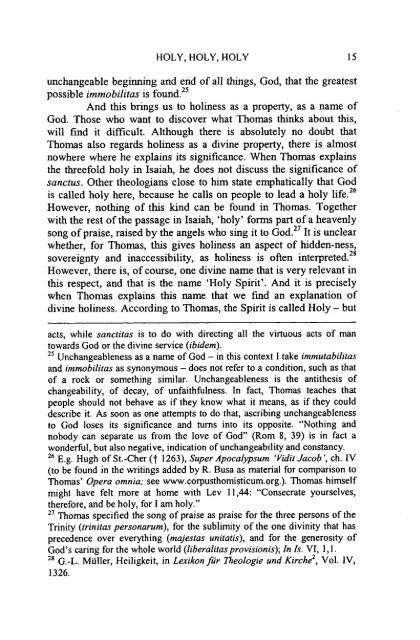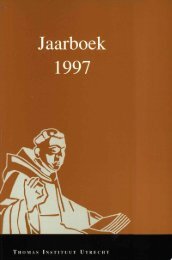Jaarboek Thomas Instituut 2006 - Thomas Instituut te Utrecht
Jaarboek Thomas Instituut 2006 - Thomas Instituut te Utrecht
Jaarboek Thomas Instituut 2006 - Thomas Instituut te Utrecht
Create successful ePaper yourself
Turn your PDF publications into a flip-book with our unique Google optimized e-Paper software.
HOLY, HOLY, HOLY 15<br />
unchangeable beginning and end of all things, God, that the grea<strong>te</strong>st<br />
possible immobilitas is found."<br />
And this brings us to holiness as a property, as a name of<br />
God. Those who want to discover what <strong>Thomas</strong> thinks about this,<br />
will find it difficult. Although there is absolu<strong>te</strong>ly no doubt that<br />
<strong>Thomas</strong> also regards holiness as a divine property, there is almost<br />
nowhere where he explains its significance. When <strong>Thomas</strong> explains<br />
the threefold holy in Isaiah, he does not discuss the significance of<br />
sanctus. Other theologians close to him sta<strong>te</strong> emphatically that God<br />
is called holy here, because he calls on people to lead a holy life."<br />
However, nothing of this kind can be found in <strong>Thomas</strong>. Together<br />
with the rest of the passage in Isaiah, 'holy' forms part of a heavenly<br />
song of praise, raised by the angels who sing it to God.27 It is unclear<br />
whether, for <strong>Thomas</strong>, this gives holiness an aspect of hidden-ness,<br />
sovereignty and inaccessibility, as holiness is of<strong>te</strong>n in<strong>te</strong>rpre<strong>te</strong>d."<br />
However, there is, of course, one divine name that is very relevant in<br />
this respect, and that is the name 'Holy Spirit'. And it is precisely<br />
when <strong>Thomas</strong> explains this name that we find an explanation of<br />
divine holiness. According to <strong>Thomas</strong>, the Spirit is called Holy - but<br />
acts, while sanctitas is to do with directing all the virtuous acts of man<br />
towards God or the divine service (ibidem).<br />
25 Unchangeableness as a name of God - in this con<strong>te</strong>xt I take immutabilitas<br />
and immobilitas as synonymous - does not refer to a condition, such as that<br />
of a rock or something similar. Unchangeableness is the antithesis of<br />
changeability, of decay, of unfaithfulness. In fact, <strong>Thomas</strong> <strong>te</strong>aches that<br />
people should not behave as if they know what it means, as if they could<br />
describe it. As soon as one at<strong>te</strong>mpts to do that, ascribing unchangeableness<br />
to God loses its significance and turns into its opposi<strong>te</strong>. "Nothing and<br />
nobody can separa<strong>te</strong> us from the love of God" (Rom 8, 39) is in fact a<br />
wonderful, but also negative, indication of unchangeability and constancy.<br />
26 E.g. Hugh of St.-Cher (t 1263), Super Apocalypsum 'Vidit Jacob', eh. IV<br />
(to be found in the writings added by R. Busa as ma<strong>te</strong>rial for comparison to<br />
<strong>Thomas</strong>' Opera omnia; see www.corpusthomisticum.org.). <strong>Thomas</strong> himself<br />
might have felt more at home with Lev 11,44: "Consecra<strong>te</strong> yourselves,<br />
therefore, and be holy, for I am holy."<br />
27 <strong>Thomas</strong> specified the song of praise as praise for the three persons of the<br />
Trinity (trinitas personarum), for the sublimity of the one divinity that has<br />
precedence over everything (majestas unitatis), and for the generosity of<br />
God's caring for the whole world (liberalitas provision is); In Is. VI, I, J.<br />
28 G.-L. Müller, Heiligkeit, in Lexikon fûr Theologie und Kirche", Vol. IV,<br />
1326.








